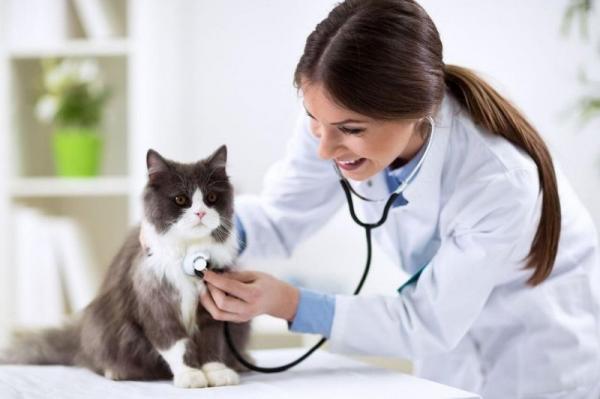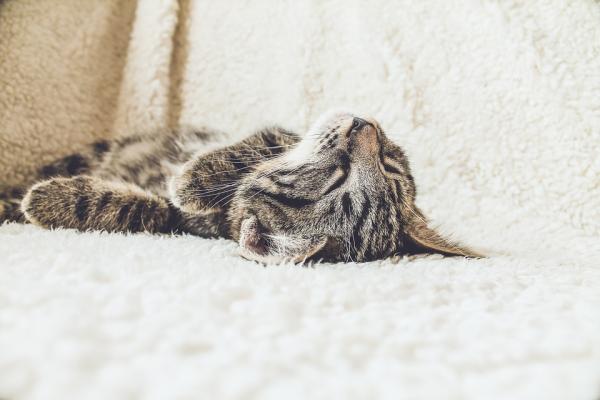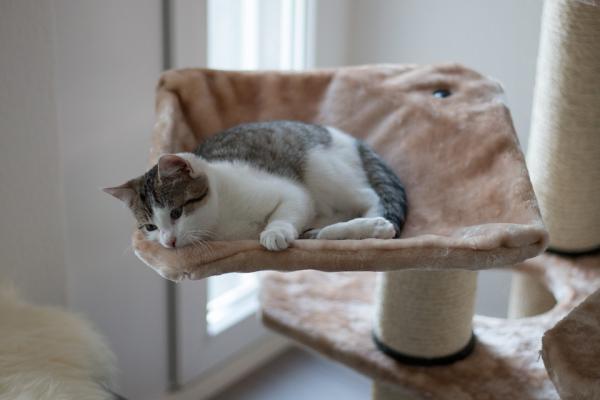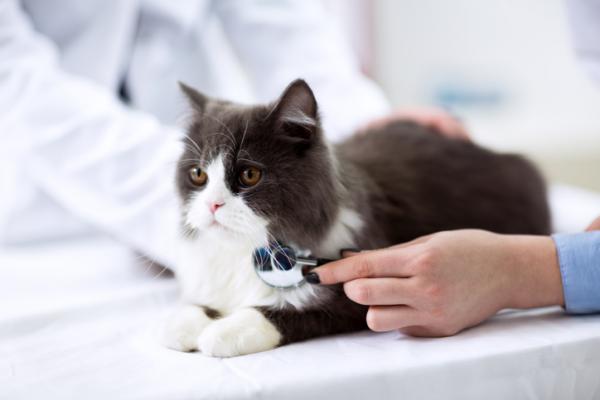Heart failure in cats – Causes, Symptoms and Treatment

La congestive heart failure It is a clinical picture that can affect the heart of our cats, preventing them from supplying the blood needed to oxygenate their organism. Any cat can develop such a disorder, either mestizo or of a defined race, but older felines are usually more vulnerable.
Because this condition demonstrates general and unspecific symptoms, it is essential to be aware of any changes in the behavior or routine of our colleagues. In this new article, we suggest you to better understand the possible causes, the treatment and the prevention for heart failure in cats.
What is heart failure?
In medical terminology, the term “heart failure” is used to refer to various disorders which are characterized by the weakening of cardiac structures and consequent decline in their performance. All insufficiency symptoms appear when some organ or body gland is incapable of correctly or fully exerting its organic functions.
When we talk about heart failure, we find the inability of the heart to pump enough blood for the correct functioning of the organism. This picture usually affects dogs, cats and humans in a very similar way.
When detecting a failure in the cardiac performance, the organism activates a series of palliative mechanisms to obtain that the oxygen reaches the bodily tissues. However, with the worsening of heart damage, these compensatory measures become ineffective and not very sustainable. Therefore, when it is not treated quickly, the lack of prolonged oxygenation usually causes sudden death of the feline.

Structure and functioning of the heart in cats
El heart of cats, like ours, is divided into two sides (right and left), each with two cameras, one upper and one lower. The upper chambers are called “auricles“, While the lower ones are called”ventricles” Between the atria and the ventricles are the heart valves, with the mitral valve being the best known. Are those that control blood flow between the cavities of the heart, allowing the heart rate to remain stable.
The blood that enters the heart coming from the body, enters through the right atrium to then be “pushed” towards the right ventricle. Then, this blood is conducted to the lungs, where it must release carbon dioxide absorbed from body tissues, and absorb oxygen. Is oxygenated blood returns to the heart, entering through the left atrium to then pass to the left ventricle. From there, it must be pumped through the aorta to bring oxygen and nourish all the body’s tissues.
Heart failure can occur on the left, right or both sides of the heart. In addition, it can affect the mitral valve, generating the call mitral regurgitation. The place of origin of the cardiac failure will determine the evolution of the disease and will cause specific symptoms.
In more severe cases, heart failure in cats can evolve into a severe condition commonly referred to as “enlarged heart” This phenomenon originates when the left ventricle suffers an excessive and anomalous enlargement, becoming so fragile to the point of losing its functionality, and suddenly stop pumping blood for the body.
Possible causes of heart failure in cats
Usually, cardiac problems are related to various possible causes. In most cats, heart failure is related to a degenerative pathology called Hypertrophic cardiomyopathy. This disorder causes the thickening of the walls of the myocardium, preventing the correct flow of blood through the cardiac cavities.
Many cats also develop heart failure as a result of degenerative changes caused by chronic diseases of the heart valves, being the mitral valve affected more frequently. These structural alterations cause blockages or deficiencies in the functionality of these valves, compromising the cardiac output.
In addition, we can mention some conditions like causes associated with feline heart failure:
- Hyperthyroidism
- Hypertension
- Fluid accumulation in the pericardial sac
- Congenital deformities in the walls or valves of the heart
- Endocarditis (infection of the heart valves)
- Presence of clots in cardiac structures
- Arrhythmias and heart rhythm disturbances
- Feline heartworm (known as “heartworm disease”)
- Cardiac neoplasms (tumors in the heart)
- Pregnancy

Symptoms of heart failure in felines
As we mentioned at the beginning of the article, the first symptoms of heart failure in cats are homogeneous and little specific. Therefore, many owners ignore the primary signs of this disorder, such as lack of energy to play or some loss of appetite. Generally, they attribute this constant fatigue and weakness to the natural aging process of the animal. As the cardiac output of the feline goes down, the characteristic symptoms of the insufficiency begin to appear.
Symptoms of heart failure in most common cats:
- Heart murmurs: when losing its capacity to pump the blood correctly, the cardiac beatings reveal an anomalous sound, known as “blow”. The murmurs are easily detected from medical auscultation, and are usually related to mitral valve insufficiency.
- LethargyWith the worsening of heart damage, the feline develops a severe intolerance to any type of physical effort. What could previously appear as a lack of interest in playing or eating, becomes a lethargic state. It is a logical consequence of the progressive lack of oxygenation in their tissues.
- Alterations of the heart and respiratory rhythm: cats with heart failure may have shortness of breath or breathe too fast. They may show an accelerated or slower heart rate than normal. Each animal will present a specific alteration according to their state of health.
- Weight loss: with the low cardiac output, the cat will lose its normal appetite and avoid the effort of feeding. The consequence will be a rapid loss of weight that, when not treated, easily leads to severe malnutrition.
- Abdominal swelling: Cats that have insufficiency of the right ventricle, usually develop a picture called “ascites”, which is characterized by the accumulation of liquids in the stomach and abdominal cavity. This abdominal swelling generates the “panzón” aspect in our felines.
- Pulmonary edema: felines suffering from insufficiency in the left ventricle usually show a high accumulation of fluids in the lungs. This condition is popularly known as “water in the lungs”.
- Tos: cough can appear in all cases of heart failure, revealing the alteration of the animal’s respiratory rhythm. It can appear mostly during the night or after a physical activity. However, it is usually more intense in cases of left ventricular failure, being associated with the accumulation of fluid in the lungs. When the condition is not properly treated, the animal may start coughing up blood.
- Tongue, gums and mucous grayish or bluish: a physical sign directly related to poor tissue oxygenation. We can observe the mucous membranes of the mouth, the eyes or the sexual organs.
- Fainting: An advanced heart failure usually causes fainting or syncopes in cats, being a serious symptom of the general weakness of your body. At this stage, the animal is very vulnerable to sudden death or generalized paralysis.
Once again, we must highlight the importance of go to the vet against the observation of any change in the behavior or habits of your feline. This will allow an early diagnosis and immediate attention that requires a heart failure.
Treatment of heart failure in cats
The treatment to be applied in case of heart failure will depend directly on the cause and of his health status. An early diagnosis almost always allows a better prognosis for cardiac disorders. That is why it is so important to consult your veterinarian immediately when observing any symptoms in your cat.
When the condition derives from a hyperthyroidism, for example, the treatment will be aimed at stabilizing the hormonal production of the thyroid gland. On the other hand, congenital insufficiencies may require surgical intervention to regain the correct blood flow in the cardiac structure.
However, we should consider that, in general, heart failure in cats does not have a definitive cure. The treatment, in the vast majority of diagnosed cases, is based on the stabilization of the feline health picture, as well as on the prevention of the progression of its symptoms. The veterinarian may prescribe certain medications to maintain stable performance cardiac and avoid fluid retention. In addition, it will be essential to adopt a alimentación designed especially for cats with heart problems.
If the feline already has accumulation of fluids in his lungs or in his abdominal cavity, it will also be essential to hospitalize him to perform a drainage process and subject him to assisted breathing until his lung capacity is recovered. With the proper treatment, a cat with heart failure You can regain your well-being and greatly improve your life expectancy.

Is it possible to prevent heart failure in cats?
Although we can not change the Genetic heritage of our felines, we are able to offer a healthy routine that will strengthen your immune system, improve your physical resistance and avoid the complications associated with overweight and sedentary lifestyle. To begin with, we must provide our cats with balanced diet and keep them physically and mentally stimulated throughout their lives.
Remember to make Periodic visits to the veterinarian every 6 months, in addition to following the cat vaccination calendar and its periodic deworming. Do not hesitate to call immediately on the trusted professional to identify any alteration in the appearance or behavior of your feline.
This article is merely informative, in .com we do not have the faculty to prescribe veterinary treatments or make any kind of diagnosis. We invite you to take your pet to the veterinarian in case of any type of condition or discomfort.
If you want to read more articles similar to Heart failure in cats – Causes, Symptoms and Treatment, we recommend that you enter in our section of Cardiovascular Diseases.


